Why Your Tankless Water Heater Needs Regular Attention
Tankless water heater descaling is the process of removing mineral deposits that build up inside your unit over time. Here's what you need to know:
Quick Answer: How to Descale Your Tankless Water Heater
- Turn off power and gas to the unit
- Close water isolation valves and relieve pressure
- Connect hoses to hot and cold service ports
- Circulate descaling solution (vinegar or commercial descaler) for 45-60 minutes using a submersible pump
- Flush with clean water for 3-5 minutes
- Reconnect everything and restore power/gas
- Test hot water at a nearby faucet
Recommended frequency: At least once per year, or every 6 months if you have hard water.
While you enjoy the endless hot water from your tankless heater, mineral deposits like calcium and magnesium are quietly building up inside. This buildup, known as scale, is more than a minor issue. Even a thin layer of limescale can slash your heater's efficiency by up to 30%, undermining one of the key benefits of going tankless.
The good news? Descaling is a straightforward maintenance task you can handle yourself in about 90 minutes. Or, for total peace of mind, professional service ensures the job is done right without risking damage to your unit.
In areas like Bridgeville with hard water, regular descaling isn't optional—it's essential for keeping your hot water flowing and your energy bills in check.
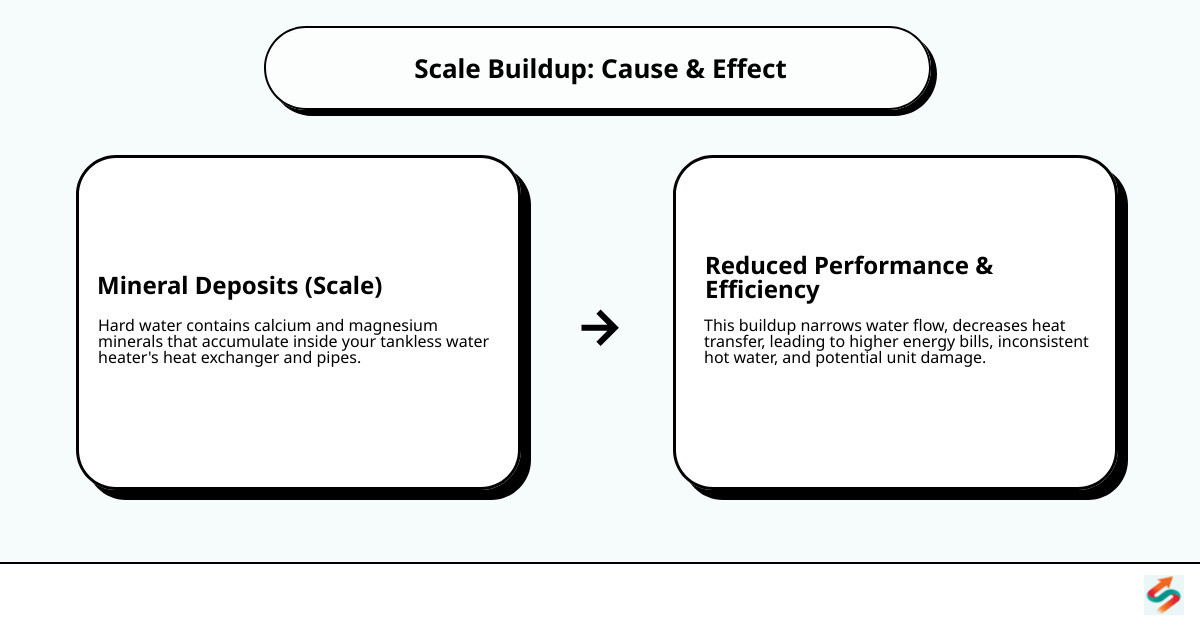
Need professional help with your tankless water heater? Contact Sureway Comfort for expert service in the Bridgeville area.
Tankless water heater descaling terms made easy:
Why Descaling is Essential for Your Tankless Water Heater
Tankless water heaters promise significant energy savings and a long lifespan, but these benefits depend on one critical task: tankless water heater descaling. Scale is the hard, chalky deposit of minerals (mainly calcium and magnesium) that builds up inside your unit, similar to the crust you see in a coffee pot. This buildup insulates the heat exchanger, forcing it to work harder and reducing energy efficiency by up to 30%. This not only increases your utility bills but also puts extra strain on the unit, leading to a shorter lifespan.
Scale buildup can also be the culprit behind frustrating temperature fluctuations during your shower.
Water hardness is a key factor. If you live in Bridgeville, South Fayette, or surrounding areas, you likely have hard water, which accelerates scale buildup. In these cases, you may need to descale every 6 months instead of annually. Even with a water softener, some minerals can still cause issues over time.
Signs Your Heater is Crying for a Flush
Your tankless water heater will give you signs when it needs attention. Here's what to watch for:
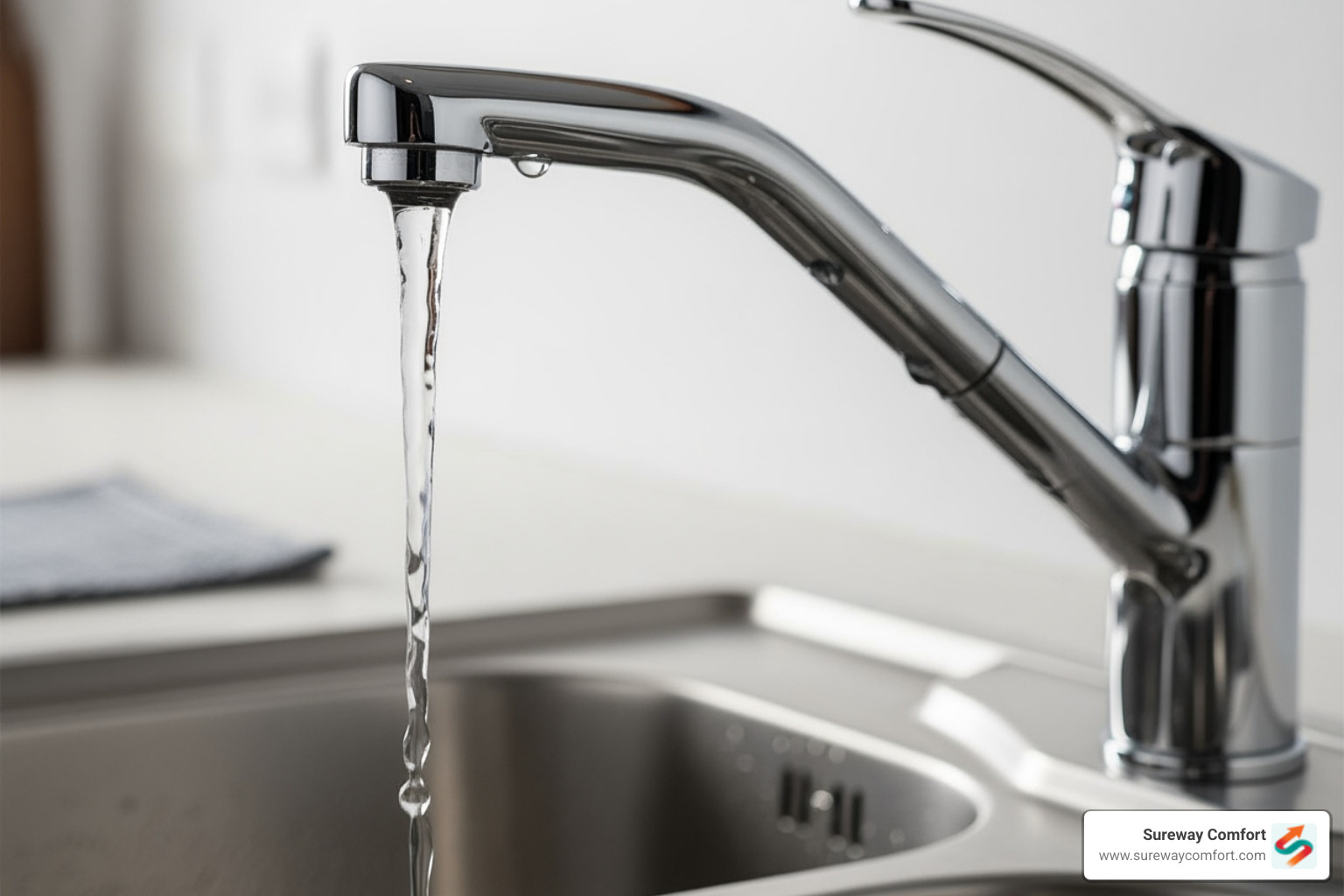
- Fluctuating water temperatures: If your shower can't maintain a steady temperature, the heat exchanger is likely struggling with scale buildup.
- Reduced water flow: When hot water pressure drops noticeably compared to cold water, scale is likely clogging the internal pipes.
- Strange noises: Tankless units are normally quiet. Any rumbling, popping, or banging sounds often indicate mineral deposits rattling around inside.
- System error codes: Many error codes related to flow or heating problems point directly to scale. Check your owner's manual to see what your unit is trying to tell you.
The Risks of Skipping Your tankless water heater descaling
Ignoring descaling is like ignoring your car's check engine light—it leads to bigger problems. Here are the risks:
- Heat exchanger damage: Scale can cause this critical, expensive component to overheat, warp, or crack, often requiring a full unit replacement.
- Clogged waterways: As scale accumulates, water flow becomes more restricted, eventually reducing your hot water to a trickle.
- Overheating: Scale insulates the heat exchanger, causing internal temperatures to rise and potentially damaging sensitive electronic components.
- Premature unit failure: A 15-20 year lifespan can shrink to just 10-12 years without proper descaling.
- Increased energy bills: Your unit works harder and burns more fuel to heat water through the layer of scale, increasing your monthly costs.
- Voiding your manufacturer warranty: Most manufacturers require regular maintenance, including descaling. Neglecting it can leave you paying for repairs out of pocket.
The bottom line? Regular descaling is essential. If you'd rather leave this to the pros, contact Sureway Comfort for expert service that keeps your warranty intact.
Gearing Up: Tools and Supplies for Descaling
Before starting your tankless water heater descaling, gathering the right tools and supplies is essential for a smooth and safe process. A well-prepared setup prevents mid-job interruptions. Many hardware stores sell convenient descaling kits that bundle most of these items together.
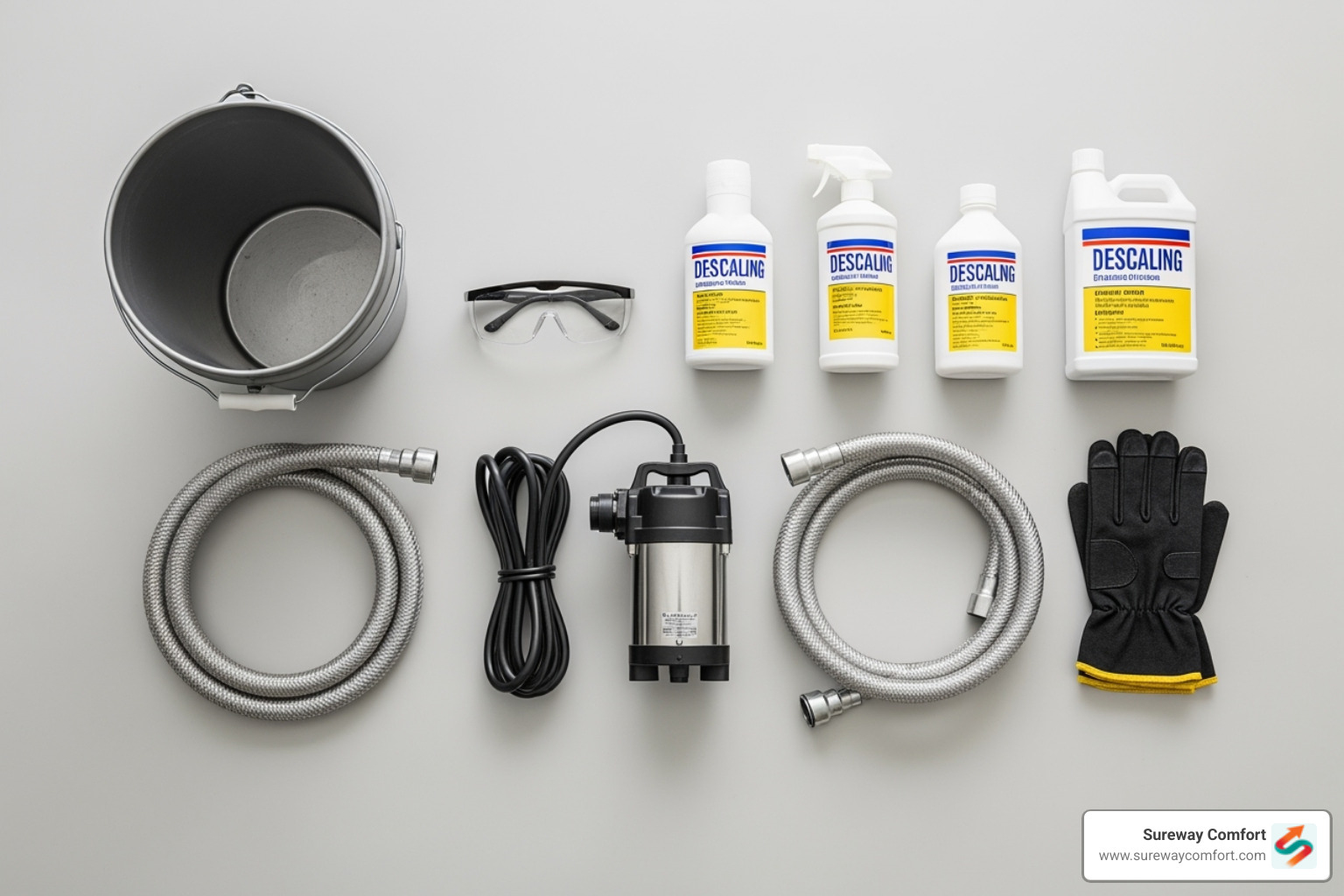
Tools and Safety Equipment
- Submersible pump: A small (1/5 or 1/6 HP) pump designed for acidic solutions.
- Two washing machine hoses: Long enough to connect the heater's service valves to a bucket on the floor.
- 5-gallon bucket: To hold the descaling solution.
- Channel-lock pliers or adjustable wrench: For loosening and tightening connections.
- Safety glasses and rubber gloves: Essential for protecting your eyes and skin from the descaling solution. A face mask is also recommended.
Choosing Your Solution: Vinegar vs. Commercial Descaler for tankless water heater descaling
You can use either household white vinegar or a commercial descaling solution. Both are effective, but the best choice depends on your situation.
White Vinegar
- Pros: Inexpensive, non-toxic, readily available, and gentle on heater components. Safe for homes with kids and pets, as noted by the National Poison Control Center.
- Cons: Milder, so it may be less effective on severe buildup and has a strong smell.
Commercial Descaling Solution
- Pros: Formulated for fast, thorough removal of heavy scale buildup. Ideal for very hard water or neglected units.
- Cons: More expensive and requires careful handling due to its strength. You must use a solution approved by your heater's manufacturer to avoid damage and voiding the warranty.
For most homeowners doing annual maintenance, vinegar is sufficient. If you're dealing with years of neglect or live in an area with very hard water like Bridgeville, a commercial solution may be better for the first flush. If you're unsure, the experts at Sureway Comfort can provide guidance.
Your Step-by-Step Guide to Tankless Water Heater Descaling
This step-by-step guide makes the tankless water heater descaling process manageable. Follow these instructions carefully for the best results. Always check your manufacturer's manual first, as there can be small differences between brands.
If you're not familiar with your unit's service valves, our Tankless Water Heater Valve Complete Guide can help.
Step 1: Isolate the Heater and Connect Hoses

Safety is the top priority. Before starting, shut off all power and water to the unit.
- Turn off power and gas. Flip the circuit breaker for your unit and turn off the gas supply valve.
- Isolate the water. Turn the main cold and hot water isolation valves so the handles are perpendicular to the pipes.
- Relieve pressure. Slowly unscrew the caps from the hot and cold service valves. A little water may drip out; this is normal, but be cautious as it may be hot.
- Connect your hoses. Attach one hose to the cold service valve and the other to the hot service valve.
- Set up the circulation system. Connect the free end of the cold-side hose to your submersible pump's outlet. Place the pump in your empty 5-gallon bucket. Let the free end of the hot-side hose hang into the same bucket.
Step 2: Circulate the Descaling Solution
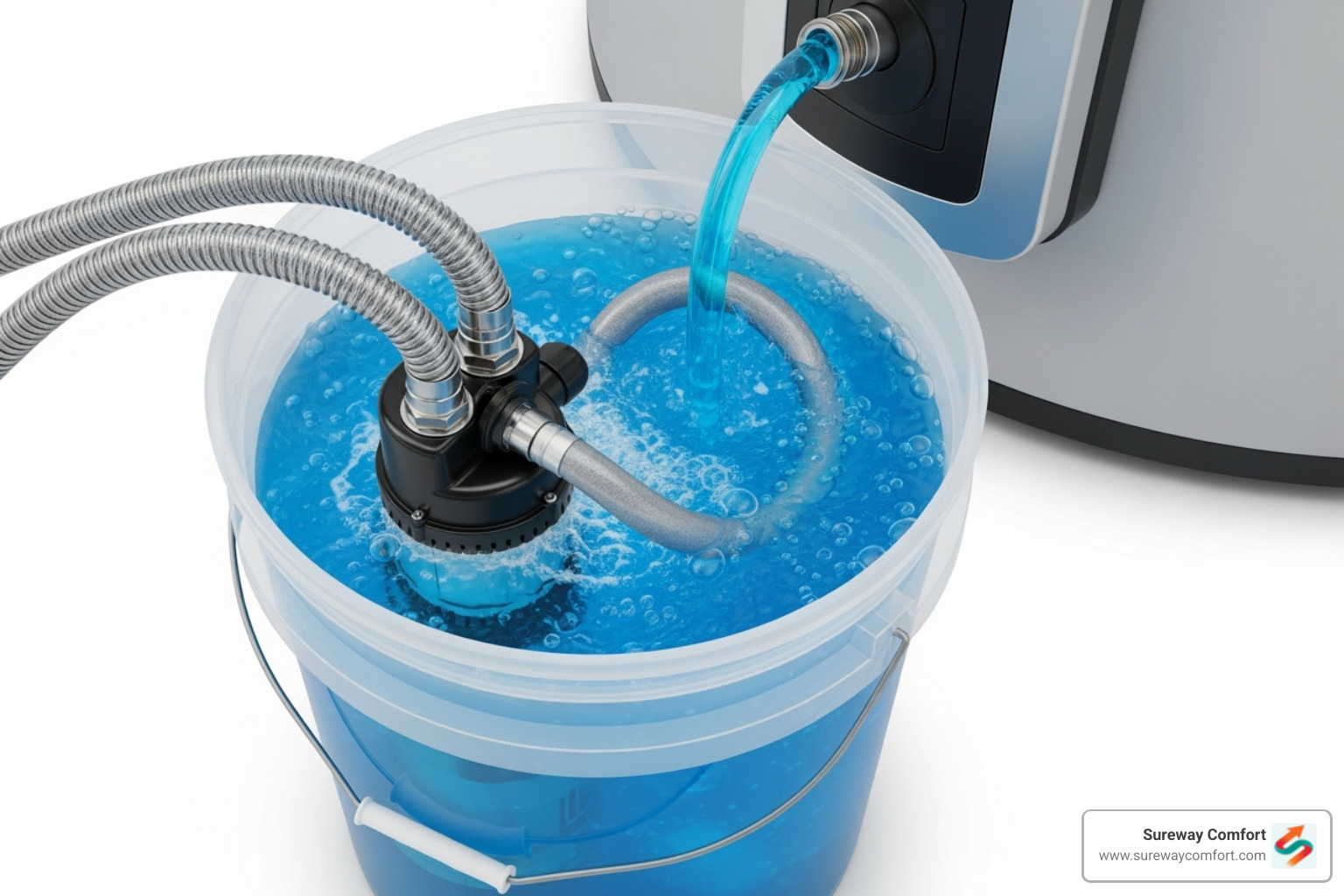
Now it's time for the solution to do its work.
- Prepare the solution. Pour 3-4 gallons of undiluted white vinegar or your prepared commercial descaler into the bucket. Ensure the pump is fully submerged.
- Open the service valves. Turn both service valve handles so they are parallel to the pipes.
- Start circulation. Plug in the pump and let the solution circulate for at least 45 minutes. For very hard water (common in areas like Bridgeville or Bethel Park) or if it's been a while, let it run for a full 60 minutes. Check on the pump periodically to ensure it's running smoothly.
Step 3: Flush, Reconnect, and Test
Properly flushing the system is a critical final step.
- Drain the solution. Unplug the pump. Close the cold service valve, then disconnect the hose from it to drain any remaining solution into the bucket. Dispose of the used solution according to local regulations.
- Flush with clean water. Rinse the bucket and fill it with fresh water. With the hot-side hose still in the bucket, reconnect the cold-side hose to the cold service valve. Open the main cold water isolation valve to flush fresh water through the unit for 3-5 minutes, until the water runs clear.
- Close everything up. Close both service valves (handles perpendicular). Disconnect the hoses and securely replace the service valve caps.
- Restore power and gas. Open the main hot and cold water isolation valves. Turn the power and gas supply back on.
- Test your work. Turn on a nearby hot water faucet. It may sputter at first as air escapes. Once the water runs smoothly, check for consistent temperature and strong flow. Do a final check around your unit for any leaks.
Congratulations on descaling your heater! Record the date for your next annual maintenance. If this process feels overwhelming, contact us at Sureway Comfort. Our technicians are happy to handle it for you.
After the Flush: Maintenance and Professional Help
Your tankless water heater is now free of scale, but ongoing care is key to its longevity. Deciding between DIY tankless water heater descaling and professional service is a common question. DIY is a rewarding, cost-saving project for those with basic plumbing skills, but incorrect work can risk damage and void your warranty.
Professional descaling provides best peace of mind. Technicians have the right tools and expertise to do the job safely and efficiently, often performing other routine checks at the same time. This preserves your warranty and ensures your unit is in top shape. For comprehensive Water Heater Services, professional help is the most reliable option.
Call a professional if you're uncomfortable with the process, if problems persist after descaling, or if you simply want the confidence of expert service.
Long-Term Maintenance Tips
Keep your tankless water heater running optimally with these simple habits:
- Clean the air intake filter: Check the filter monthly and clean it as needed to ensure proper airflow and efficiency.
- Inspect for leaks: Every few months, visually check around the unit and its connections for any signs of drips, dampness, or corrosion.
- Monitor water pressure: If your home's water pressure consistently exceeds 80 PSI, consider installing a pressure regulator to prevent strain on your unit.
- Consider a water softener: For homes in areas with hard water like Bridgeville, a whole-house water softener is a smart investment. It dramatically reduces mineral buildup, extending the time between descaling and protecting all your plumbing fixtures.
- Schedule an annual professional inspection: A trained technician can spot potential issues you might miss, from venting concerns to early signs of component wear.
For a visual guide, this video is a helpful resource: Video | Step by Step How to Flush your Tankless Water Heater.
Ready to schedule professional maintenance? Contact Sureway Comfort for expert service in the Bridgeville area.
Frequently Asked Questions about Descaling
We've answered some of the most common questions about tankless water heater descaling to help you understand this essential maintenance task.
How often should I descale my tankless water heater?
Most manufacturers recommend descaling at least once a year. However, your local water quality is the biggest factor. In areas with hard water, like Bridgeville, Canonsburg, or Upper St. Clair, you may need to descale every 6 to 12 months. High water usage and higher temperature settings also accelerate scale buildup. Always check your owner's manual for specific recommendations and adjust based on your conditions. It's safer to descale more often than not enough.
Can I damage my heater by descaling it myself?
Yes, there is a risk of damage if the process is done incorrectly. Common mistakes include using unapproved chemicals, creating leaks from improper hose connections, or failing to flush the system completely. These errors can damage sensitive components like the heat exchanger. Importantly, improper maintenance can void your manufacturer's warranty, leaving you responsible for repair costs. While DIY descaling is safe if you follow instructions carefully, professional service offers peace of mind. If you're uncertain, it's best to contact us for expert help.
How long does the descaling process take?
The entire process typically takes 60 to 90 minutes. This includes about 15-20 minutes for setup, 45-60 minutes for the solution to circulate (during which you can step away), and another 15-20 minutes for flushing and reconnection. It's a manageable project for a weekend morning that pays off in long-term efficiency and lifespan.
Keep the Hot Water Flowing with Expert Care
Regular tankless water heater descaling is a smart investment in your home's comfort and efficiency. This simple routine ensures your unit operates at peak performance, lowering energy bills, extending its lifespan to a full 15-20 years, and providing the reliable hot water you depend on.
Whether you handle the descaling yourself or prefer to leave it to the professionals, the key is making it happen. Some homeowners enjoy DIY maintenance, while others value the assurance of an experienced technician.
For homeowners throughout Bridgeville, South Fayette, Mt. Lebanon, Bethel Park, Canonsburg, Upper St. Clair, and the surrounding communities, Sureway Comfort is here to help. Our experienced technicians bring years of expertise to every tankless water heater descaling service. We perform comprehensive maintenance checks to catch potential issues before they become major problems.
Our flexible maintenance plans take the guesswork out of servicing your tankless water heater. Let us handle the scheduling and the service, so you can focus on enjoying endless hot water.
Ready to schedule your professional descaling service? Contact us for professional tankless water heater services in Bethel Park, PA and find out why your neighbors trust Sureway Comfort for all their HVAC and plumbing needs.



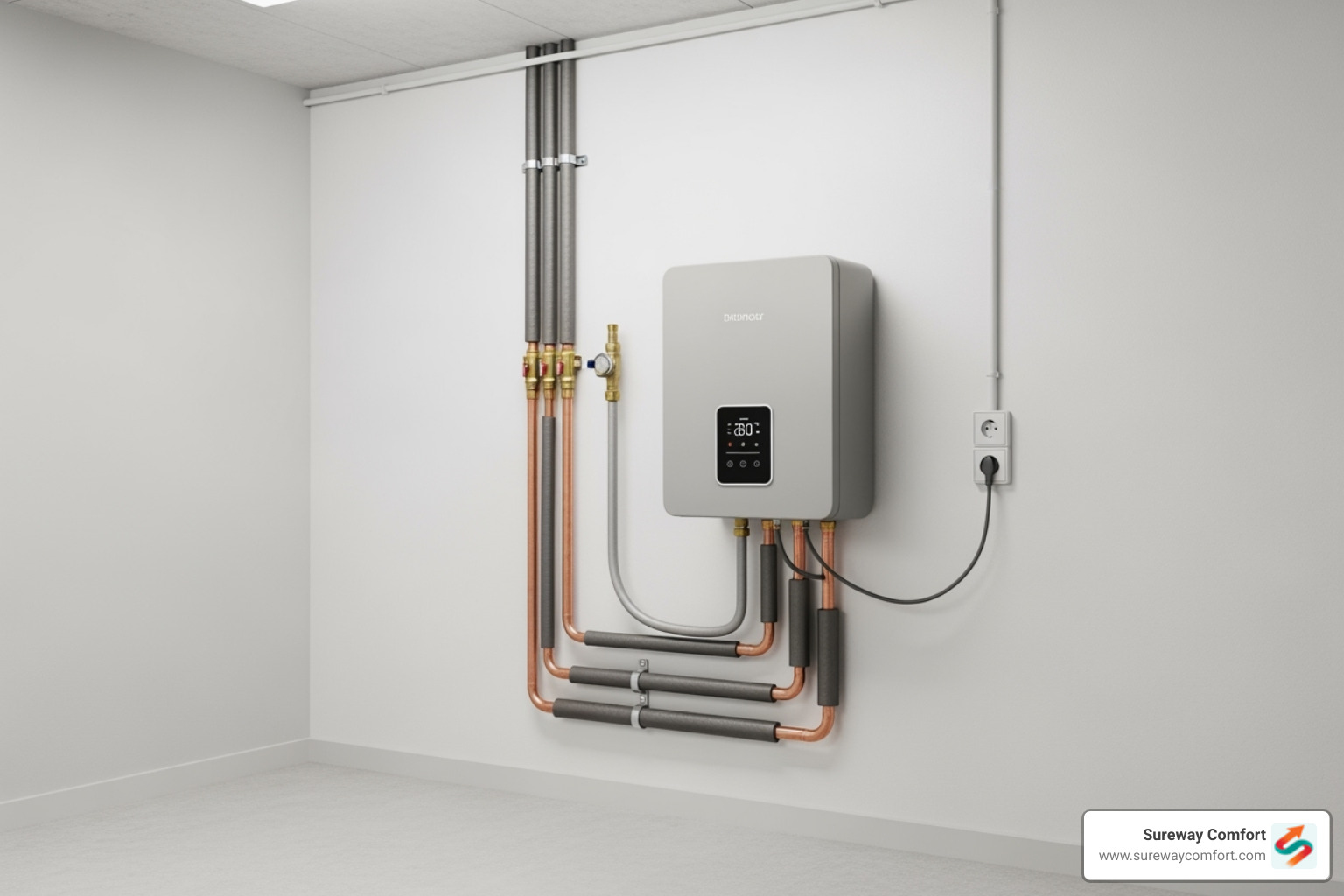
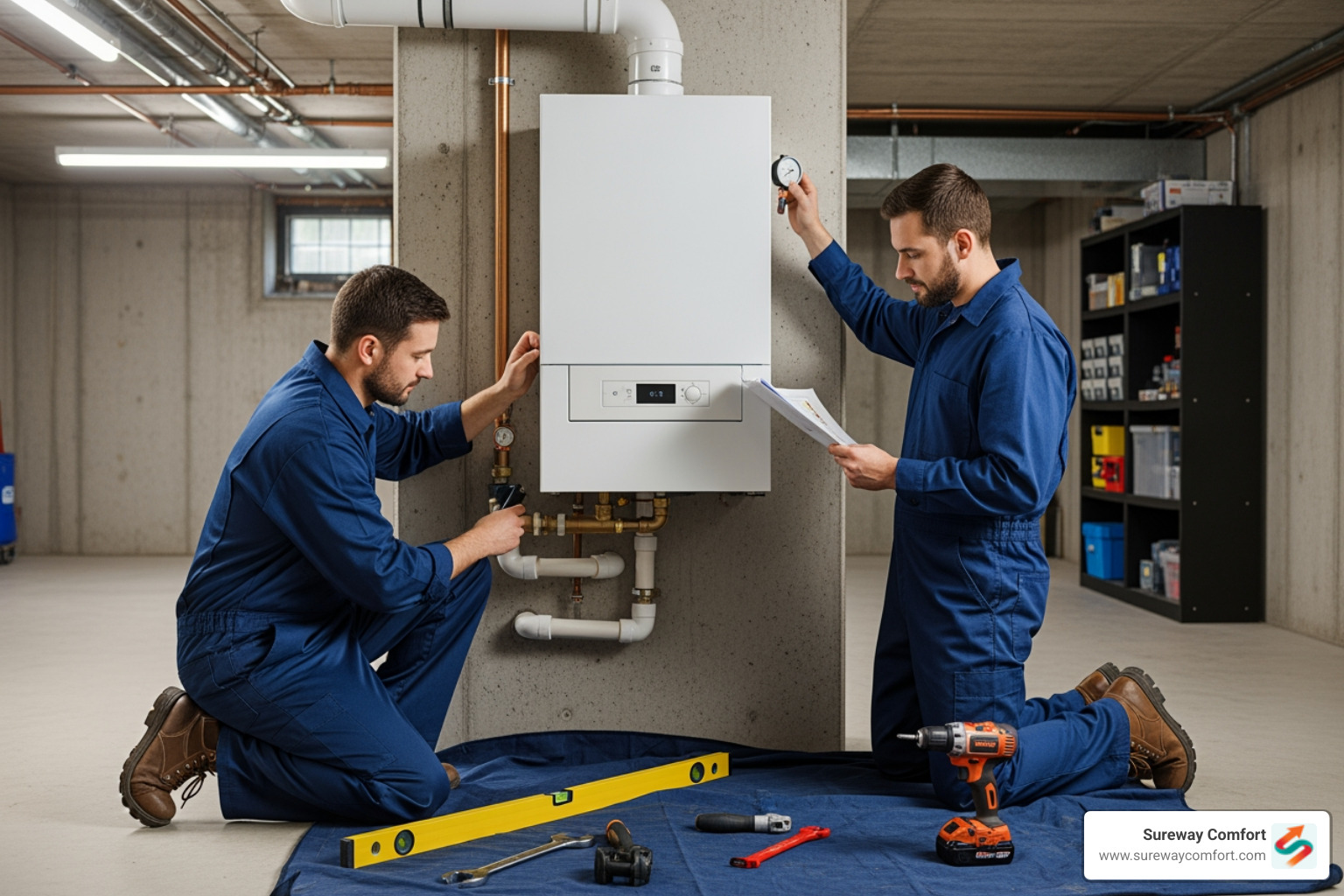

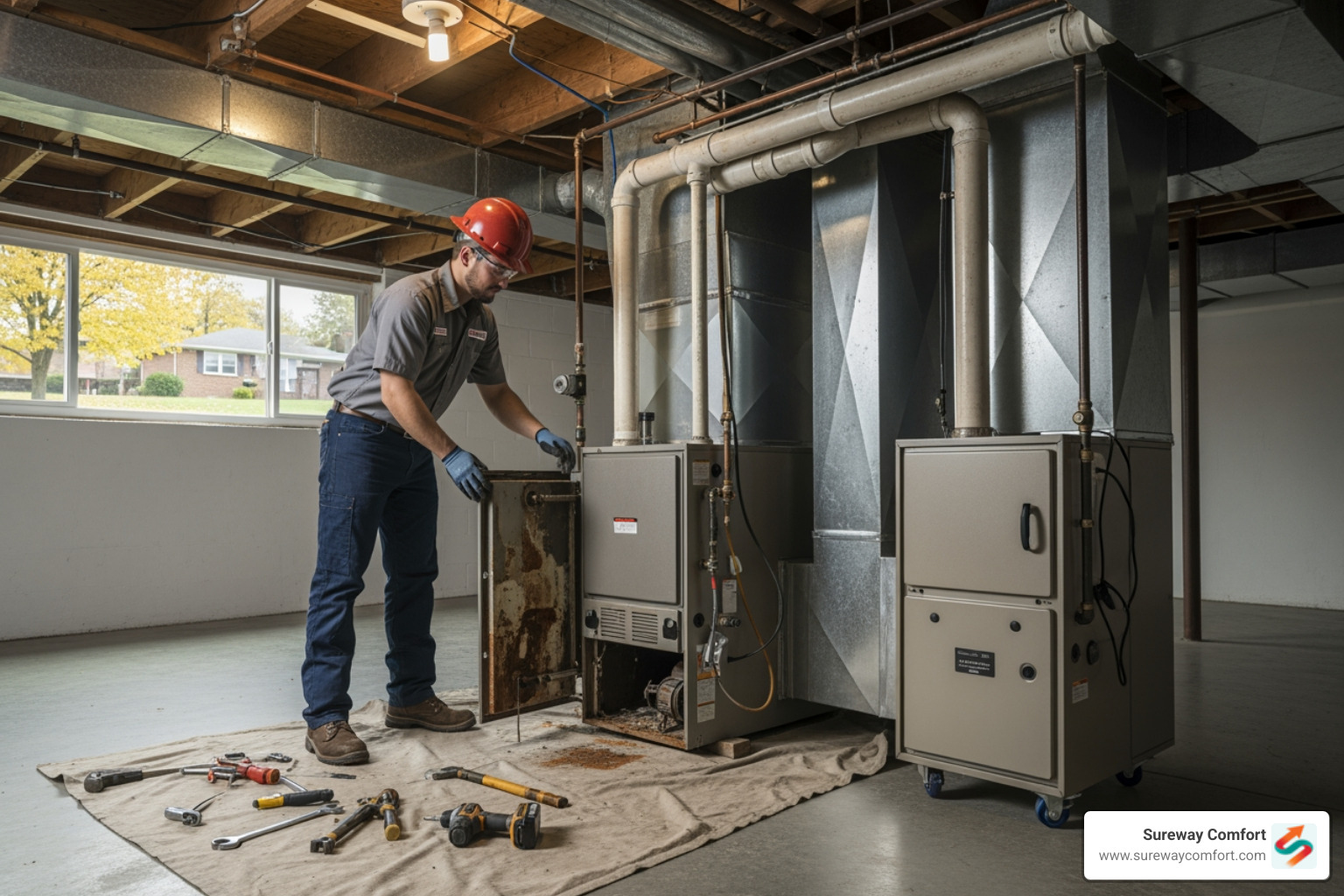
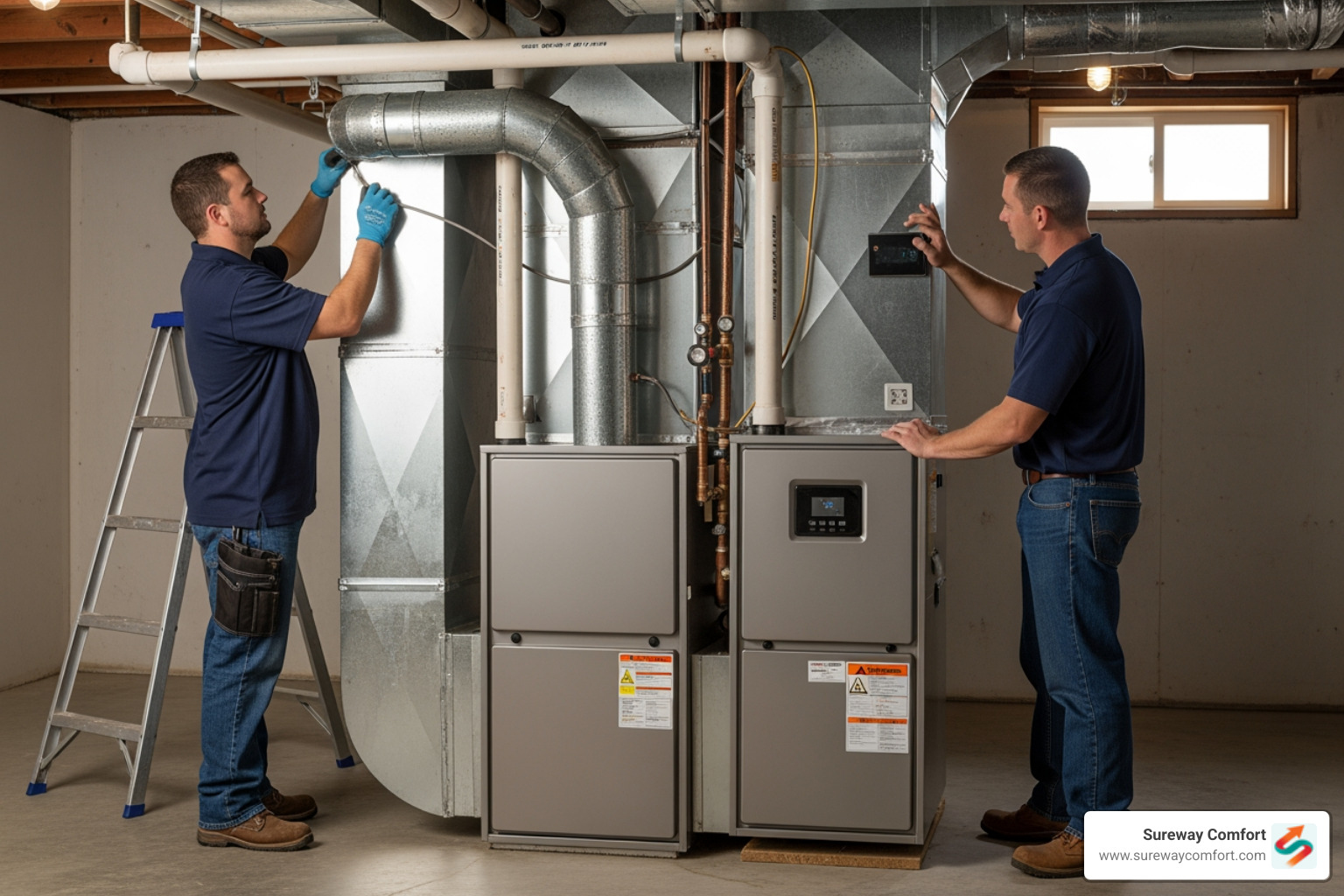




















.avif)



